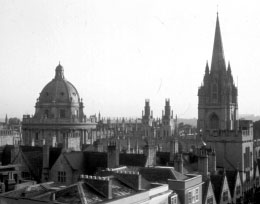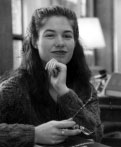DMS Rhodes Scholar is heading off to Oxford's "towery city"
Investigating how to regenerate damaged nerve cells and how to revitalize the health-care delivery system are among the aspirations of Dartmouth's newest Rhodes Scholar, second-year DMS student Courtney Voelker. Voelker is one of 32 Rhodes recipients in the U.S. and approximately 95 worldwide in 2001. She will use the award to work toward a doctorate in the physiological sciences.
Grueling process: Her goals are ambitious, but the Rhodes Scholarship provides an opportunity to study in what 19th-century poet Gerard Manley Hopkins called the "towery city" of Oxford, England—a place that has bred many great scientists and thinkers. And, besides, anyone who can endure the grueling Rhodes selection process can probably do anything. Not only did the application itself take months to complete, but it was followed by two solid days of state interviews and two equally long days for regional interviews, with only one day off in between for travel.
After Voelker's state interviews, the jury deliberated for eight hours, leaving the applicants to wonder who would move on. "We were sitting for eight hours together in this room . . . and we actually got to know each other quite well," she says. "Every once in a while, one of the judges would come back into the room and say, 'You may need to order some pizza; we're going to be here for a while.'" Finally, the judges announced their decision to the assembled applicants. Happily, it was on to the regional interviews for Voelker, followed by a dash back to Hanover for final exams.
The interest in nerve regeneration that she plans to pursue with the help of the scholarship arose from an amalgam of personal and scientific experiences. Voelker's sister, Jennifer, was disabled as a child when an injury damaged her inner ear.
Awareness: Voelker thus grew up with a tangible awareness of the principle that some nerve cells can't regenerate. During college (she's an alumna of Brown University), she spent a summer at the National Institutes of Health studying the herpes simplex virus's effect on the trigeminal nerve, and this sparked her research interest in neuroscience.
More immediately prefiguring Voelker's current path was a year she spent studying at Oxford as an undergraduate. She had one neuroscientist as her tutor and worked in the lab of another. Both encouraged Voelker to apply for a scholarship to return. "I really enjoyed the lab I was working in and the subjects," Voelker says. "So I thought I'd give it a shot—it's such a shot in the dark."
Now that Voelker has hit the mark, she'll begin work on a project that combines her two Oxford mentors' studies. While the central nervous system (CNS) can't regenerate in animals after birth, it has shown regeneration in utero. "What I'm going to be looking at," explains Voelker, "is basically doing a genetic screen of the fetus and a genetic screen of the adult at different stages, and comparing where the genes change—so trying to target which genes are responsible for CNS regeneration."

|

Courtney Voelker, left, a second-year Dartmouth medical student, was one of 32 U.S. recipients of a Rhodes Scholarship this year. She will study nerve regeneration at Oxford University, pictured above. Voelker photo by Joseph Mehling |
That's the first step, which she admits is "huge." The next step will be learning how to manipulate the genes that permit or prevent nerve regeneration. "It's very exciting. I'm really looking forward to it," she says.
Although Voelker has been to Oxford already, she expects this stint to be enriching because of the chance to expose herself to new perspectives. "The department that I'll be working in is very diverse," she says. "Each of these people is trained in such a different type of system, and it brings together different ways of thinking about a problem."
Diversity: This is something the Rhodes program fosters in drawing students from all over the world to Oxford. Even at her interviews, Voelker met people with wide-ranging interests in politics, art, and literature, as well as in other areas of science.
Voelker's second major interest —improving how the health-care system treats people —also grew from her observation of her sister's disability. Her family moved from Denver to Portland when Voelker was nine in order to facilitate treatment for her sister, and ever since then she has "been motivated by the good physicians and the bad physicians that you see."
"My goal," Voelker says, "is really to attack medicine . . . to put an emphasis on combining the research aspect and the clinical aspect, because we're at a stage in medical technology when the two are separating." She envisions an institute where scientists and clinicians in different fields work as a team for the benefit of patients.
But first she has to complete her training. After her studies at Oxford, she'll return to the United States to finish the clinical part of her education at Brown Medical School in Providence, R.I.; Voelker is a member of the Brown-Dartmouth Program, under which students spend their first two years of medical school at DMS and their second two at Brown.
Triad: DMS not only provided Dartmouth with its most recent Rhodes Scholar but also boasts three faculty members with a Rhodes on their resume. They are John Baldwin, M.D., a professor of surgery and DMS's dean [see page 65 in this issue for his thoughts on Voelker's award]; pediatric ophthalmologist Susan Pepin, M.D., an assistant professor of surgery; and parasitologist Elmer Pfefferkorn, M.D., who joined the DMS faculty in 1967 and is now an emeritus professor of microbiology.
Pfefferkorn was struck by Voelker's "exceptionally strong academic background [and her] well thought-out plan for her studies at Oxford. . . . I had a splendid two years at Oxford," he recalls. Voelker has no doubt but that she will as well.
-Jonathan Weisberg
If you would like to offer any feedback about this article, we would welcome getting your comments at DartMed@Dartmouth.edu.
